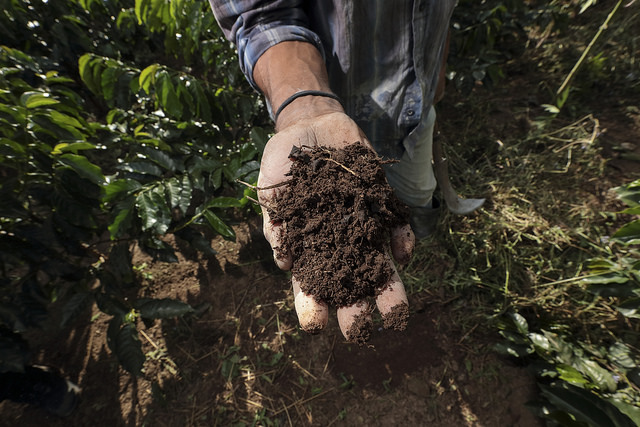
José Alonso Benítez shows healthy soil from his coffee farm in San Juan, Intibucá, Honduras. Courtesy of Silverlight.
It is time to move beyond the idea of sustainable coffee. Sustaining something assumes that what we have is already good enough. Yet numerous studies have shown that if the coffee industry does not change its current “business-as-usual” approach, we will not have quality coffee in the future. And this will hurt everyone that currently benefits from the sector — from farmers at origin to that coffee shop consumer who enjoys a specialty pourover from a distant tropical paradise.
Roasters will have less coffee to sell, and consumers will have fewer options. Meanwhile, hundreds of thousands of farmers throughout the world will need to find alternative economic solutions for their families, either on their farms or by migrating somewhere else. In short, sustaining coffee as it is produced today will eventually lead to failure throughout the coffee industry, notably in specialty coffee.
That is the bad news. Now comes the good part: We do not have to be satisfied with sustaining the status quo. Instead, we can make an asserted move toward regenerative coffee. You may have already come across the trendy term regenerative agriculture, which in fact has been around for decades, and it has one central theme: healthy soil. The recent 2018 Natural Products Expo West, boasting some 85,000 attendees, highlighted regenerative agriculture products throughout the event. Sizeable companies such as Annie’s Homegrown (purchased by General Mills for $840 million in 2014) have made it a point to source from farmers who implement regenerative agriculture practices through a soil-first agricultural system.
The idea of regeneration in this context — and this is what makes it different from sustainability — is that agricultural practices can build soil, leaving it healthier than before. In other words, regenerative agriculture turns dirt into healthy soil. J.I. Rodale (1898-1971), an eccentric polymath who created a publishing empire and founded what later became the Rodale Institute, summarized the importance of healthy soil on a blackboard in a Pennsylvania farmhouse in 1947:
Healthy Soil = Healthy Food = Healthy People
That was, I repeat, in 1947!
Healthy soil is also essential to coffee production. The race to develop and disseminate new coffee varieties that are both more resilient to climate shocks and have the flavor profiles that consumers demand is critical (see the important work carried out by World Coffee Research); however, this effort can only reach its full potential with a complementary focus on soil management. If we adapt J.I. Rodale’s blackboard motto to coffee, it might read something like this:
Healthy Soil = More Quality Coffee = Robust Supply Chains and Thriving Farmers
Healthy soil is good for business; it is good for farmers; and it is good for consumers. Healthy soil on coffee farms also leads to more and cleaner water for communities living downstream (as discussed here and , here). It also creates greater biodiversity, above and below ground.
Estimates indicate that there are currently 10.5 million hectares of land under coffee production in over 50 countries. Imagine if the coffee produced on these hectares were regenerating soil rather than sustaining their current production system or, as is often the case, making soil conditions worse over time. The impact would be immense.
We have an opportunity to regenerate millions of hectares of land that will help millions of farmers and their families earn a better living by producing more and better coffee. This is one of the best chances we have for ensuring a supply of quality coffee despite the threat of climate change. Regenerating land, however, requires money and effort. Farmers need to earn enough to invest in their farms. We will, all of us, need to make a purposeful commitment to regeneration if we are to create the change and results that we seek.
Hugh Aprile
Hugh Aprile is the CRS Director for Regional Agriculture and Water Initiatives for Central America. He is based in Managua.






Comment